An Examination of UK Corporate Law and Its Societal Business Role
VerifiedAdded on 2021/01/03
|9
|2656
|164
Report
AI Summary
This report examines the crucial role of business in society, with a specific focus on UK corporate law and its regulatory functions. It delves into the Companies Act 2006, Insolvency Act 1986, and other relevant legislation. The report analyzes the economic foundations of corporate law, the incentives of various stakeholders like government, investors, and creditors, and the evolution from shareholder value models to stakeholder value models. It also explores the responsibilities and relationships between corporations and stakeholders like employees, customers, and suppliers. Furthermore, the report highlights the significance of corporate law in ensuring appropriate shareholder interests, promoting financial returns, and supporting overall social development and welfare. The report also touches on the roles of various stakeholders in the business and its economic foundation.
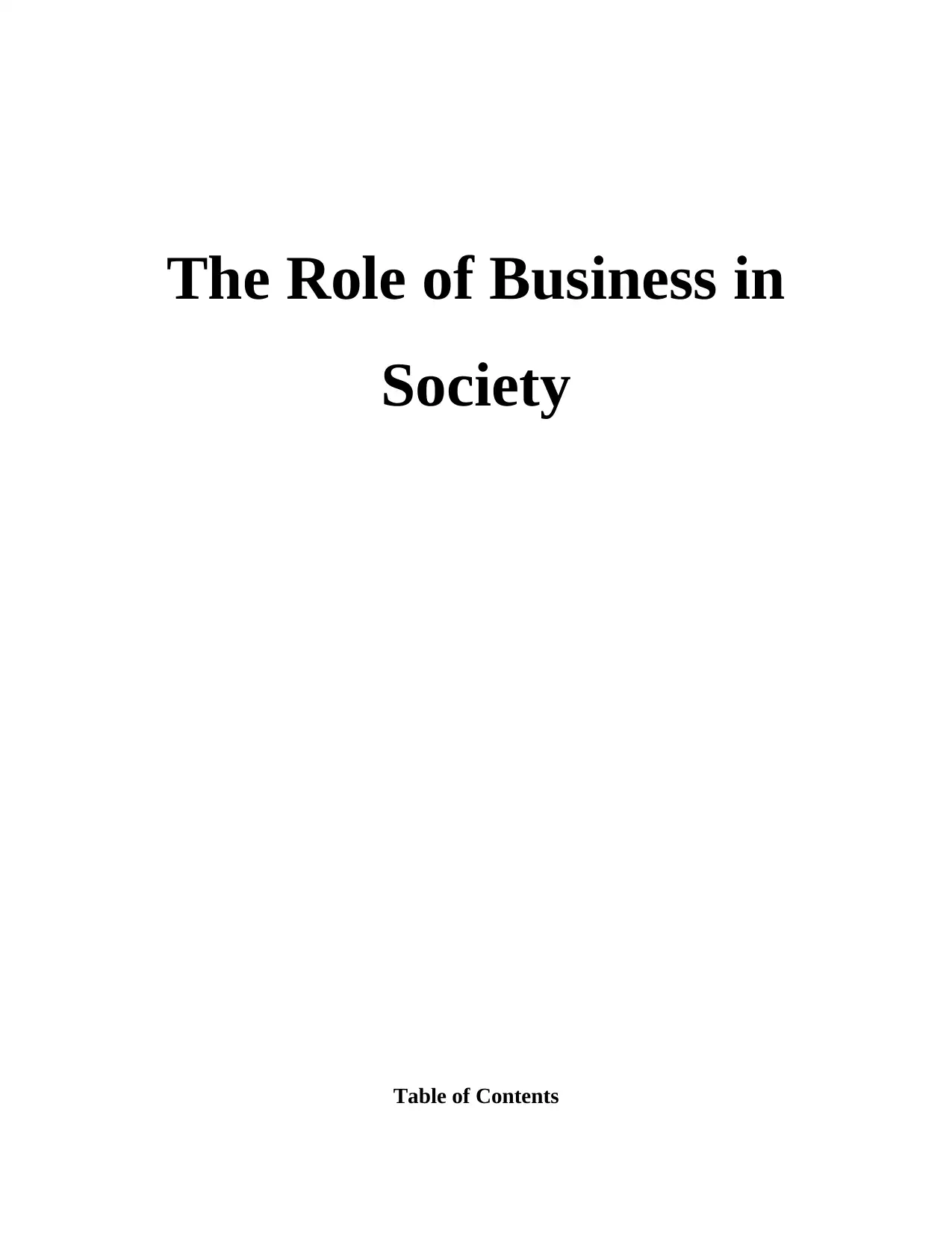
The Role of Business in
Society
Table of Contents
Society
Table of Contents
Paraphrase This Document
Need a fresh take? Get an instant paraphrase of this document with our AI Paraphraser

INTRODUCTION ..........................................................................................................................1
MAIN BODY...................................................................................................................................1
CONCLUSION................................................................................................................................6
REFERENCES................................................................................................................................7
MAIN BODY...................................................................................................................................1
CONCLUSION................................................................................................................................6
REFERENCES................................................................................................................................7
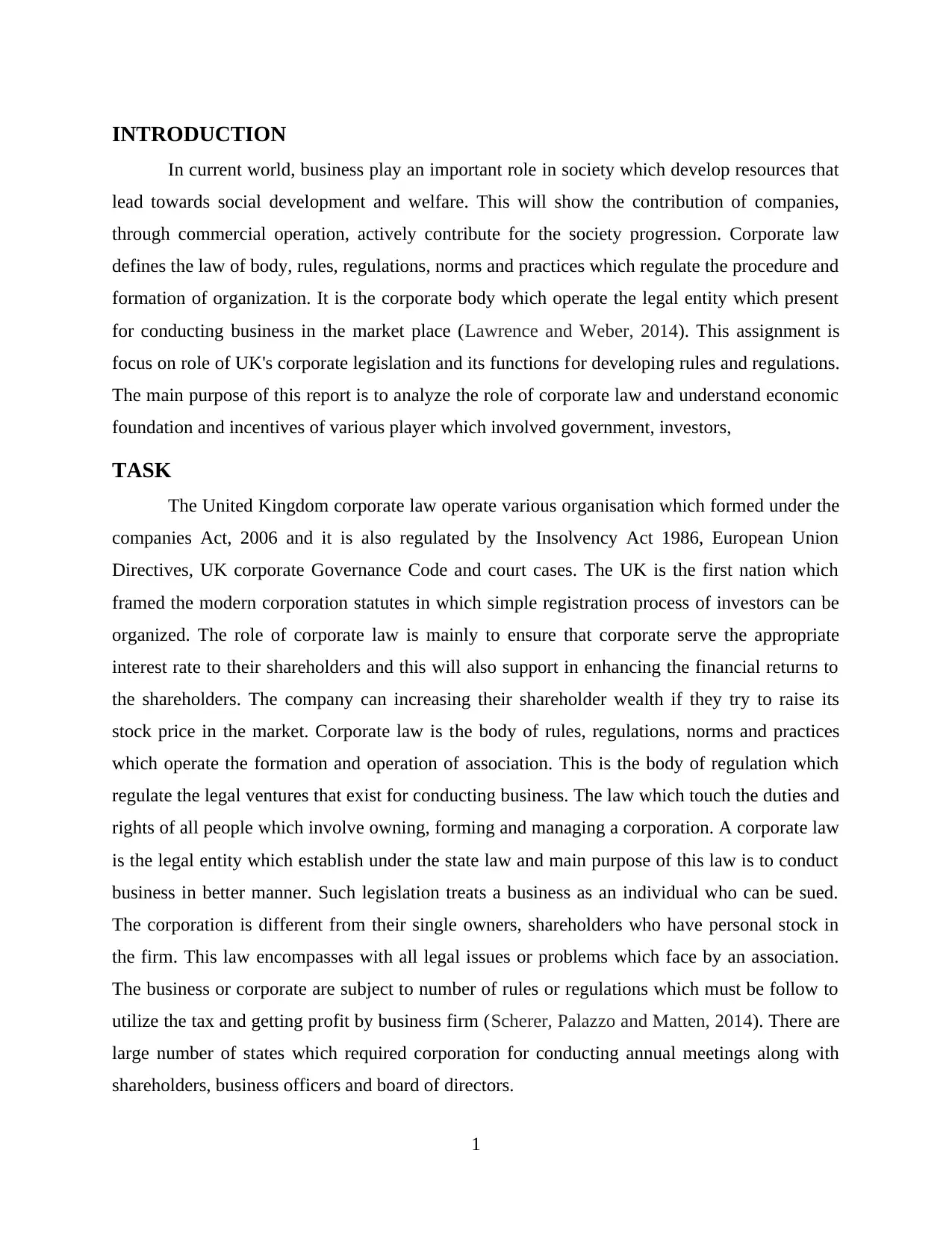
INTRODUCTION
In current world, business play an important role in society which develop resources that
lead towards social development and welfare. This will show the contribution of companies,
through commercial operation, actively contribute for the society progression. Corporate law
defines the law of body, rules, regulations, norms and practices which regulate the procedure and
formation of organization. It is the corporate body which operate the legal entity which present
for conducting business in the market place (Lawrence and Weber, 2014). This assignment is
focus on role of UK's corporate legislation and its functions for developing rules and regulations.
The main purpose of this report is to analyze the role of corporate law and understand economic
foundation and incentives of various player which involved government, investors,
TASK
The United Kingdom corporate law operate various organisation which formed under the
companies Act, 2006 and it is also regulated by the Insolvency Act 1986, European Union
Directives, UK corporate Governance Code and court cases. The UK is the first nation which
framed the modern corporation statutes in which simple registration process of investors can be
organized. The role of corporate law is mainly to ensure that corporate serve the appropriate
interest rate to their shareholders and this will also support in enhancing the financial returns to
the shareholders. The company can increasing their shareholder wealth if they try to raise its
stock price in the market. Corporate law is the body of rules, regulations, norms and practices
which operate the formation and operation of association. This is the body of regulation which
regulate the legal ventures that exist for conducting business. The law which touch the duties and
rights of all people which involve owning, forming and managing a corporation. A corporate law
is the legal entity which establish under the state law and main purpose of this law is to conduct
business in better manner. Such legislation treats a business as an individual who can be sued.
The corporation is different from their single owners, shareholders who have personal stock in
the firm. This law encompasses with all legal issues or problems which face by an association.
The business or corporate are subject to number of rules or regulations which must be follow to
utilize the tax and getting profit by business firm (Scherer, Palazzo and Matten, 2014). There are
large number of states which required corporation for conducting annual meetings along with
shareholders, business officers and board of directors.
1
In current world, business play an important role in society which develop resources that
lead towards social development and welfare. This will show the contribution of companies,
through commercial operation, actively contribute for the society progression. Corporate law
defines the law of body, rules, regulations, norms and practices which regulate the procedure and
formation of organization. It is the corporate body which operate the legal entity which present
for conducting business in the market place (Lawrence and Weber, 2014). This assignment is
focus on role of UK's corporate legislation and its functions for developing rules and regulations.
The main purpose of this report is to analyze the role of corporate law and understand economic
foundation and incentives of various player which involved government, investors,
TASK
The United Kingdom corporate law operate various organisation which formed under the
companies Act, 2006 and it is also regulated by the Insolvency Act 1986, European Union
Directives, UK corporate Governance Code and court cases. The UK is the first nation which
framed the modern corporation statutes in which simple registration process of investors can be
organized. The role of corporate law is mainly to ensure that corporate serve the appropriate
interest rate to their shareholders and this will also support in enhancing the financial returns to
the shareholders. The company can increasing their shareholder wealth if they try to raise its
stock price in the market. Corporate law is the body of rules, regulations, norms and practices
which operate the formation and operation of association. This is the body of regulation which
regulate the legal ventures that exist for conducting business. The law which touch the duties and
rights of all people which involve owning, forming and managing a corporation. A corporate law
is the legal entity which establish under the state law and main purpose of this law is to conduct
business in better manner. Such legislation treats a business as an individual who can be sued.
The corporation is different from their single owners, shareholders who have personal stock in
the firm. This law encompasses with all legal issues or problems which face by an association.
The business or corporate are subject to number of rules or regulations which must be follow to
utilize the tax and getting profit by business firm (Scherer, Palazzo and Matten, 2014). There are
large number of states which required corporation for conducting annual meetings along with
shareholders, business officers and board of directors.
1
⊘ This is a preview!⊘
Do you want full access?
Subscribe today to unlock all pages.

Trusted by 1+ million students worldwide
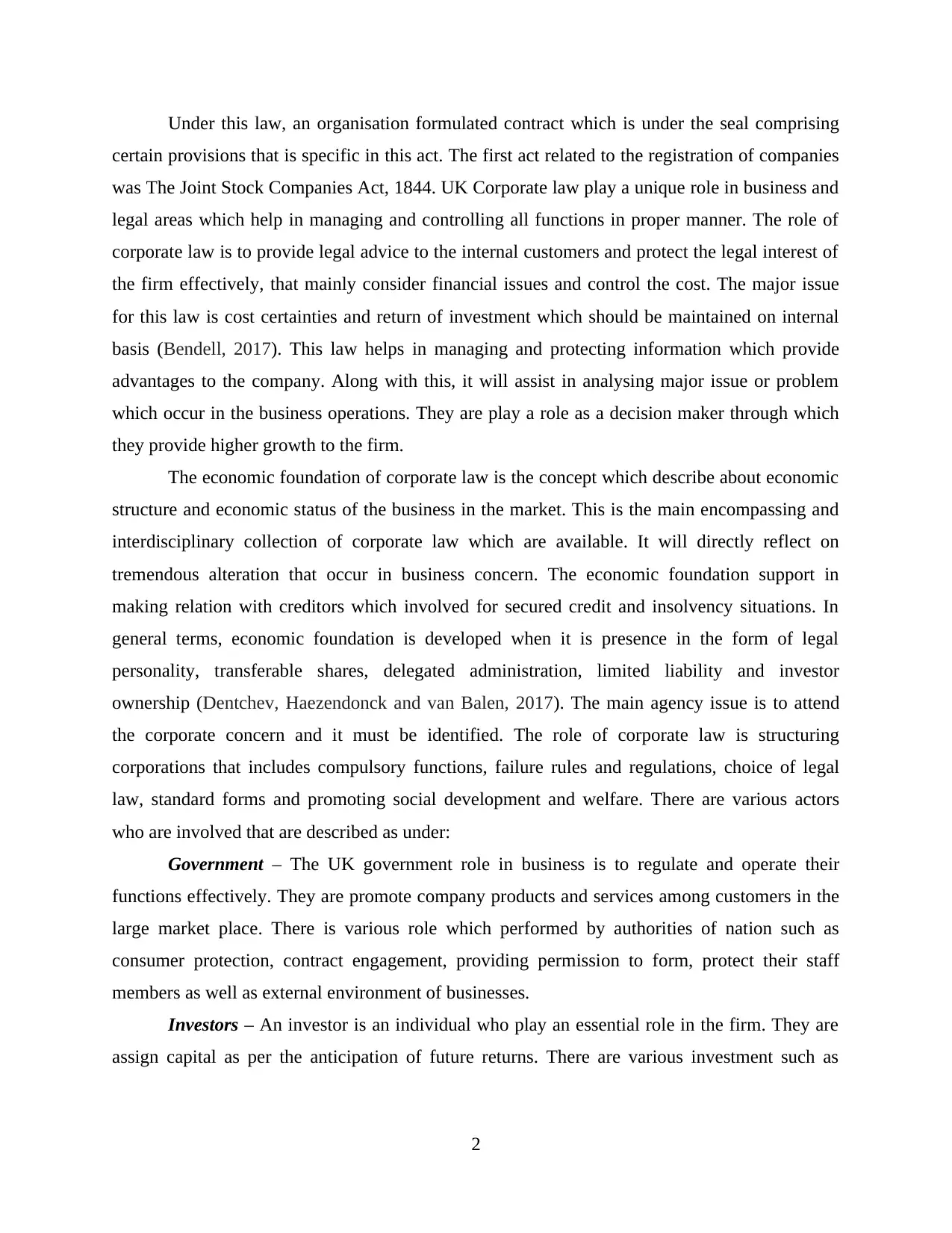
Under this law, an organisation formulated contract which is under the seal comprising
certain provisions that is specific in this act. The first act related to the registration of companies
was The Joint Stock Companies Act, 1844. UK Corporate law play a unique role in business and
legal areas which help in managing and controlling all functions in proper manner. The role of
corporate law is to provide legal advice to the internal customers and protect the legal interest of
the firm effectively, that mainly consider financial issues and control the cost. The major issue
for this law is cost certainties and return of investment which should be maintained on internal
basis (Bendell, 2017). This law helps in managing and protecting information which provide
advantages to the company. Along with this, it will assist in analysing major issue or problem
which occur in the business operations. They are play a role as a decision maker through which
they provide higher growth to the firm.
The economic foundation of corporate law is the concept which describe about economic
structure and economic status of the business in the market. This is the main encompassing and
interdisciplinary collection of corporate law which are available. It will directly reflect on
tremendous alteration that occur in business concern. The economic foundation support in
making relation with creditors which involved for secured credit and insolvency situations. In
general terms, economic foundation is developed when it is presence in the form of legal
personality, transferable shares, delegated administration, limited liability and investor
ownership (Dentchev, Haezendonck and van Balen, 2017). The main agency issue is to attend
the corporate concern and it must be identified. The role of corporate law is structuring
corporations that includes compulsory functions, failure rules and regulations, choice of legal
law, standard forms and promoting social development and welfare. There are various actors
who are involved that are described as under:
Government – The UK government role in business is to regulate and operate their
functions effectively. They are promote company products and services among customers in the
large market place. There is various role which performed by authorities of nation such as
consumer protection, contract engagement, providing permission to form, protect their staff
members as well as external environment of businesses.
Investors – An investor is an individual who play an essential role in the firm. They are
assign capital as per the anticipation of future returns. There are various investment such as
2
certain provisions that is specific in this act. The first act related to the registration of companies
was The Joint Stock Companies Act, 1844. UK Corporate law play a unique role in business and
legal areas which help in managing and controlling all functions in proper manner. The role of
corporate law is to provide legal advice to the internal customers and protect the legal interest of
the firm effectively, that mainly consider financial issues and control the cost. The major issue
for this law is cost certainties and return of investment which should be maintained on internal
basis (Bendell, 2017). This law helps in managing and protecting information which provide
advantages to the company. Along with this, it will assist in analysing major issue or problem
which occur in the business operations. They are play a role as a decision maker through which
they provide higher growth to the firm.
The economic foundation of corporate law is the concept which describe about economic
structure and economic status of the business in the market. This is the main encompassing and
interdisciplinary collection of corporate law which are available. It will directly reflect on
tremendous alteration that occur in business concern. The economic foundation support in
making relation with creditors which involved for secured credit and insolvency situations. In
general terms, economic foundation is developed when it is presence in the form of legal
personality, transferable shares, delegated administration, limited liability and investor
ownership (Dentchev, Haezendonck and van Balen, 2017). The main agency issue is to attend
the corporate concern and it must be identified. The role of corporate law is structuring
corporations that includes compulsory functions, failure rules and regulations, choice of legal
law, standard forms and promoting social development and welfare. There are various actors
who are involved that are described as under:
Government – The UK government role in business is to regulate and operate their
functions effectively. They are promote company products and services among customers in the
large market place. There is various role which performed by authorities of nation such as
consumer protection, contract engagement, providing permission to form, protect their staff
members as well as external environment of businesses.
Investors – An investor is an individual who play an essential role in the firm. They are
assign capital as per the anticipation of future returns. There are various investment such as
2
Paraphrase This Document
Need a fresh take? Get an instant paraphrase of this document with our AI Paraphraser
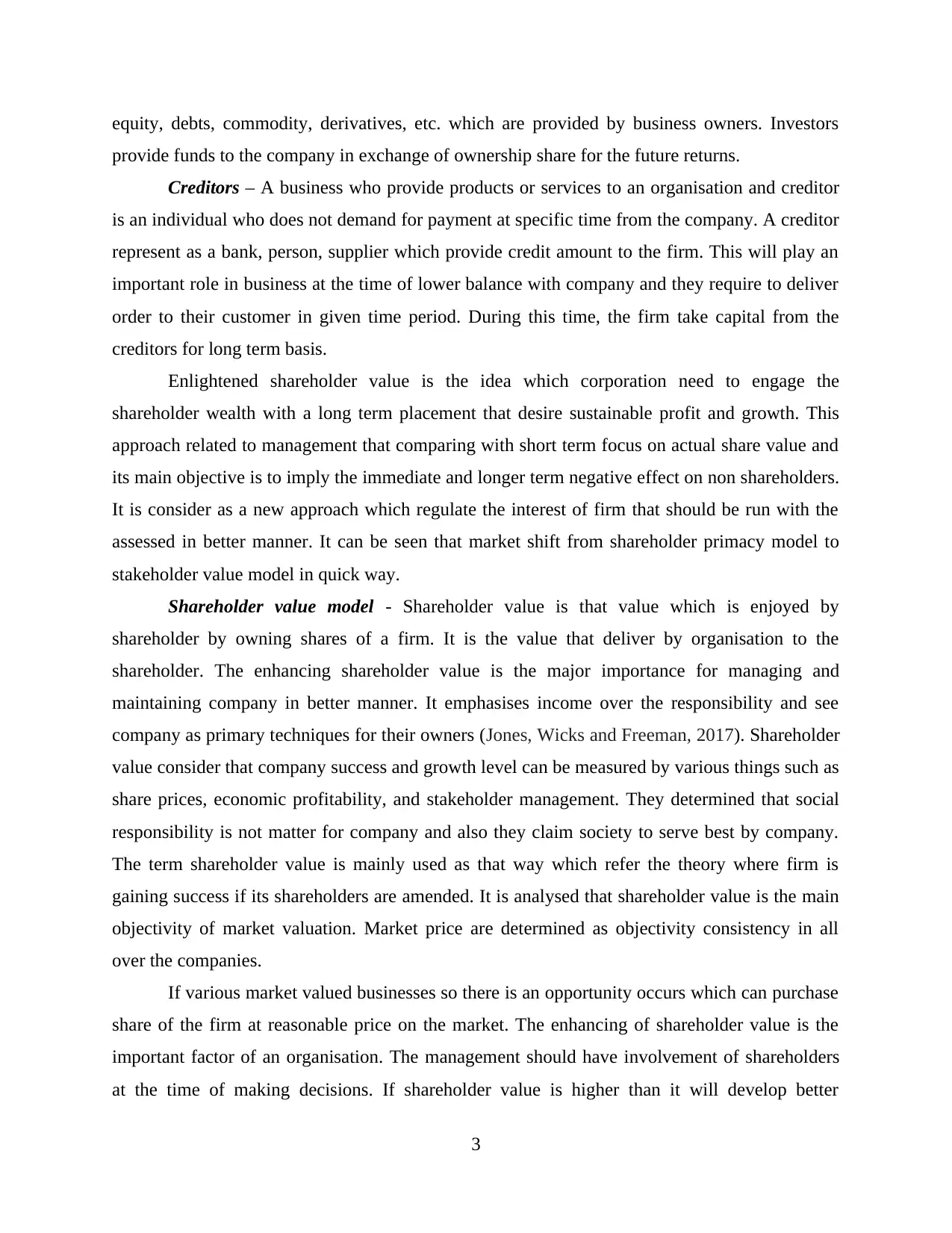
equity, debts, commodity, derivatives, etc. which are provided by business owners. Investors
provide funds to the company in exchange of ownership share for the future returns.
Creditors – A business who provide products or services to an organisation and creditor
is an individual who does not demand for payment at specific time from the company. A creditor
represent as a bank, person, supplier which provide credit amount to the firm. This will play an
important role in business at the time of lower balance with company and they require to deliver
order to their customer in given time period. During this time, the firm take capital from the
creditors for long term basis.
Enlightened shareholder value is the idea which corporation need to engage the
shareholder wealth with a long term placement that desire sustainable profit and growth. This
approach related to management that comparing with short term focus on actual share value and
its main objective is to imply the immediate and longer term negative effect on non shareholders.
It is consider as a new approach which regulate the interest of firm that should be run with the
assessed in better manner. It can be seen that market shift from shareholder primacy model to
stakeholder value model in quick way.
Shareholder value model - Shareholder value is that value which is enjoyed by
shareholder by owning shares of a firm. It is the value that deliver by organisation to the
shareholder. The enhancing shareholder value is the major importance for managing and
maintaining company in better manner. It emphasises income over the responsibility and see
company as primary techniques for their owners (Jones, Wicks and Freeman, 2017). Shareholder
value consider that company success and growth level can be measured by various things such as
share prices, economic profitability, and stakeholder management. They determined that social
responsibility is not matter for company and also they claim society to serve best by company.
The term shareholder value is mainly used as that way which refer the theory where firm is
gaining success if its shareholders are amended. It is analysed that shareholder value is the main
objectivity of market valuation. Market price are determined as objectivity consistency in all
over the companies.
If various market valued businesses so there is an opportunity occurs which can purchase
share of the firm at reasonable price on the market. The enhancing of shareholder value is the
important factor of an organisation. The management should have involvement of shareholders
at the time of making decisions. If shareholder value is higher than it will develop better
3
provide funds to the company in exchange of ownership share for the future returns.
Creditors – A business who provide products or services to an organisation and creditor
is an individual who does not demand for payment at specific time from the company. A creditor
represent as a bank, person, supplier which provide credit amount to the firm. This will play an
important role in business at the time of lower balance with company and they require to deliver
order to their customer in given time period. During this time, the firm take capital from the
creditors for long term basis.
Enlightened shareholder value is the idea which corporation need to engage the
shareholder wealth with a long term placement that desire sustainable profit and growth. This
approach related to management that comparing with short term focus on actual share value and
its main objective is to imply the immediate and longer term negative effect on non shareholders.
It is consider as a new approach which regulate the interest of firm that should be run with the
assessed in better manner. It can be seen that market shift from shareholder primacy model to
stakeholder value model in quick way.
Shareholder value model - Shareholder value is that value which is enjoyed by
shareholder by owning shares of a firm. It is the value that deliver by organisation to the
shareholder. The enhancing shareholder value is the major importance for managing and
maintaining company in better manner. It emphasises income over the responsibility and see
company as primary techniques for their owners (Jones, Wicks and Freeman, 2017). Shareholder
value consider that company success and growth level can be measured by various things such as
share prices, economic profitability, and stakeholder management. They determined that social
responsibility is not matter for company and also they claim society to serve best by company.
The term shareholder value is mainly used as that way which refer the theory where firm is
gaining success if its shareholders are amended. It is analysed that shareholder value is the main
objectivity of market valuation. Market price are determined as objectivity consistency in all
over the companies.
If various market valued businesses so there is an opportunity occurs which can purchase
share of the firm at reasonable price on the market. The enhancing of shareholder value is the
important factor of an organisation. The management should have involvement of shareholders
at the time of making decisions. If shareholder value is higher than it will develop better
3
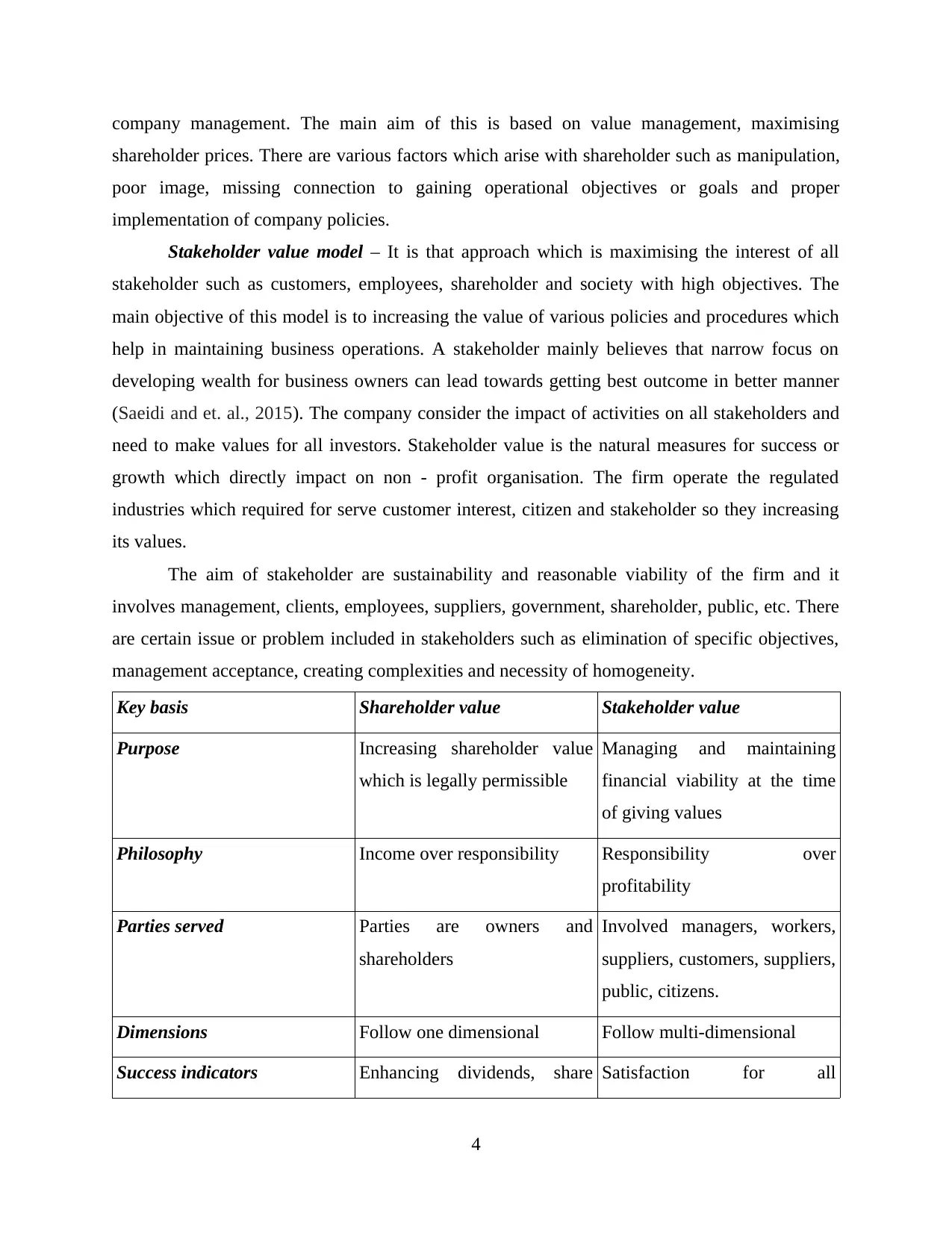
company management. The main aim of this is based on value management, maximising
shareholder prices. There are various factors which arise with shareholder such as manipulation,
poor image, missing connection to gaining operational objectives or goals and proper
implementation of company policies.
Stakeholder value model – It is that approach which is maximising the interest of all
stakeholder such as customers, employees, shareholder and society with high objectives. The
main objective of this model is to increasing the value of various policies and procedures which
help in maintaining business operations. A stakeholder mainly believes that narrow focus on
developing wealth for business owners can lead towards getting best outcome in better manner
(Saeidi and et. al., 2015). The company consider the impact of activities on all stakeholders and
need to make values for all investors. Stakeholder value is the natural measures for success or
growth which directly impact on non - profit organisation. The firm operate the regulated
industries which required for serve customer interest, citizen and stakeholder so they increasing
its values.
The aim of stakeholder are sustainability and reasonable viability of the firm and it
involves management, clients, employees, suppliers, government, shareholder, public, etc. There
are certain issue or problem included in stakeholders such as elimination of specific objectives,
management acceptance, creating complexities and necessity of homogeneity.
Key basis Shareholder value Stakeholder value
Purpose Increasing shareholder value
which is legally permissible
Managing and maintaining
financial viability at the time
of giving values
Philosophy Income over responsibility Responsibility over
profitability
Parties served Parties are owners and
shareholders
Involved managers, workers,
suppliers, customers, suppliers,
public, citizens.
Dimensions Follow one dimensional Follow multi-dimensional
Success indicators Enhancing dividends, share Satisfaction for all
4
shareholder prices. There are various factors which arise with shareholder such as manipulation,
poor image, missing connection to gaining operational objectives or goals and proper
implementation of company policies.
Stakeholder value model – It is that approach which is maximising the interest of all
stakeholder such as customers, employees, shareholder and society with high objectives. The
main objective of this model is to increasing the value of various policies and procedures which
help in maintaining business operations. A stakeholder mainly believes that narrow focus on
developing wealth for business owners can lead towards getting best outcome in better manner
(Saeidi and et. al., 2015). The company consider the impact of activities on all stakeholders and
need to make values for all investors. Stakeholder value is the natural measures for success or
growth which directly impact on non - profit organisation. The firm operate the regulated
industries which required for serve customer interest, citizen and stakeholder so they increasing
its values.
The aim of stakeholder are sustainability and reasonable viability of the firm and it
involves management, clients, employees, suppliers, government, shareholder, public, etc. There
are certain issue or problem included in stakeholders such as elimination of specific objectives,
management acceptance, creating complexities and necessity of homogeneity.
Key basis Shareholder value Stakeholder value
Purpose Increasing shareholder value
which is legally permissible
Managing and maintaining
financial viability at the time
of giving values
Philosophy Income over responsibility Responsibility over
profitability
Parties served Parties are owners and
shareholders
Involved managers, workers,
suppliers, customers, suppliers,
public, citizens.
Dimensions Follow one dimensional Follow multi-dimensional
Success indicators Enhancing dividends, share Satisfaction for all
4
⊘ This is a preview!⊘
Do you want full access?
Subscribe today to unlock all pages.

Trusted by 1+ million students worldwide
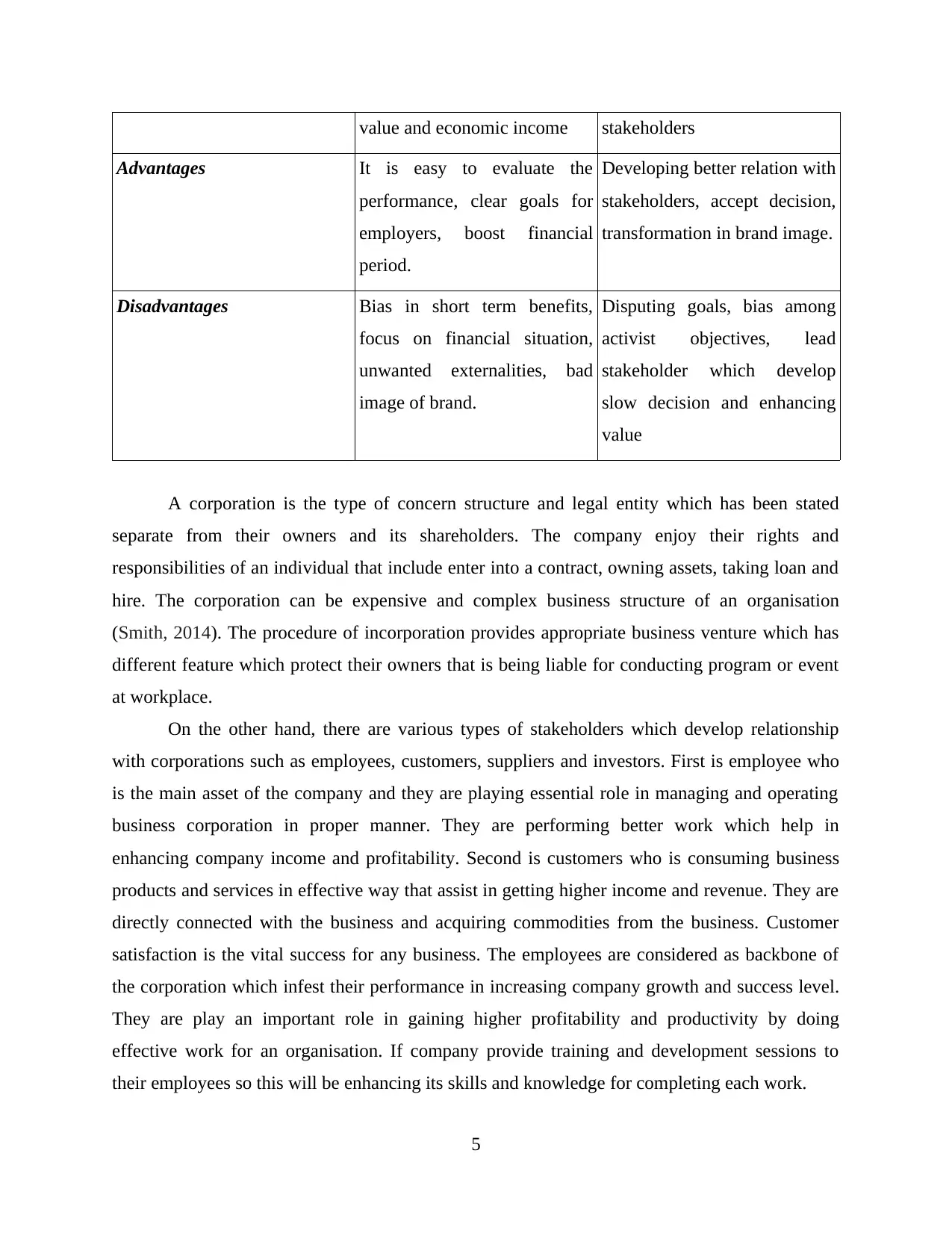
value and economic income stakeholders
Advantages It is easy to evaluate the
performance, clear goals for
employers, boost financial
period.
Developing better relation with
stakeholders, accept decision,
transformation in brand image.
Disadvantages Bias in short term benefits,
focus on financial situation,
unwanted externalities, bad
image of brand.
Disputing goals, bias among
activist objectives, lead
stakeholder which develop
slow decision and enhancing
value
A corporation is the type of concern structure and legal entity which has been stated
separate from their owners and its shareholders. The company enjoy their rights and
responsibilities of an individual that include enter into a contract, owning assets, taking loan and
hire. The corporation can be expensive and complex business structure of an organisation
(Smith, 2014). The procedure of incorporation provides appropriate business venture which has
different feature which protect their owners that is being liable for conducting program or event
at workplace.
On the other hand, there are various types of stakeholders which develop relationship
with corporations such as employees, customers, suppliers and investors. First is employee who
is the main asset of the company and they are playing essential role in managing and operating
business corporation in proper manner. They are performing better work which help in
enhancing company income and profitability. Second is customers who is consuming business
products and services in effective way that assist in getting higher income and revenue. They are
directly connected with the business and acquiring commodities from the business. Customer
satisfaction is the vital success for any business. The employees are considered as backbone of
the corporation which infest their performance in increasing company growth and success level.
They are play an important role in gaining higher profitability and productivity by doing
effective work for an organisation. If company provide training and development sessions to
their employees so this will be enhancing its skills and knowledge for completing each work.
5
Advantages It is easy to evaluate the
performance, clear goals for
employers, boost financial
period.
Developing better relation with
stakeholders, accept decision,
transformation in brand image.
Disadvantages Bias in short term benefits,
focus on financial situation,
unwanted externalities, bad
image of brand.
Disputing goals, bias among
activist objectives, lead
stakeholder which develop
slow decision and enhancing
value
A corporation is the type of concern structure and legal entity which has been stated
separate from their owners and its shareholders. The company enjoy their rights and
responsibilities of an individual that include enter into a contract, owning assets, taking loan and
hire. The corporation can be expensive and complex business structure of an organisation
(Smith, 2014). The procedure of incorporation provides appropriate business venture which has
different feature which protect their owners that is being liable for conducting program or event
at workplace.
On the other hand, there are various types of stakeholders which develop relationship
with corporations such as employees, customers, suppliers and investors. First is employee who
is the main asset of the company and they are playing essential role in managing and operating
business corporation in proper manner. They are performing better work which help in
enhancing company income and profitability. Second is customers who is consuming business
products and services in effective way that assist in getting higher income and revenue. They are
directly connected with the business and acquiring commodities from the business. Customer
satisfaction is the vital success for any business. The employees are considered as backbone of
the corporation which infest their performance in increasing company growth and success level.
They are play an important role in gaining higher profitability and productivity by doing
effective work for an organisation. If company provide training and development sessions to
their employees so this will be enhancing its skills and knowledge for completing each work.
5
Paraphrase This Document
Need a fresh take? Get an instant paraphrase of this document with our AI Paraphraser
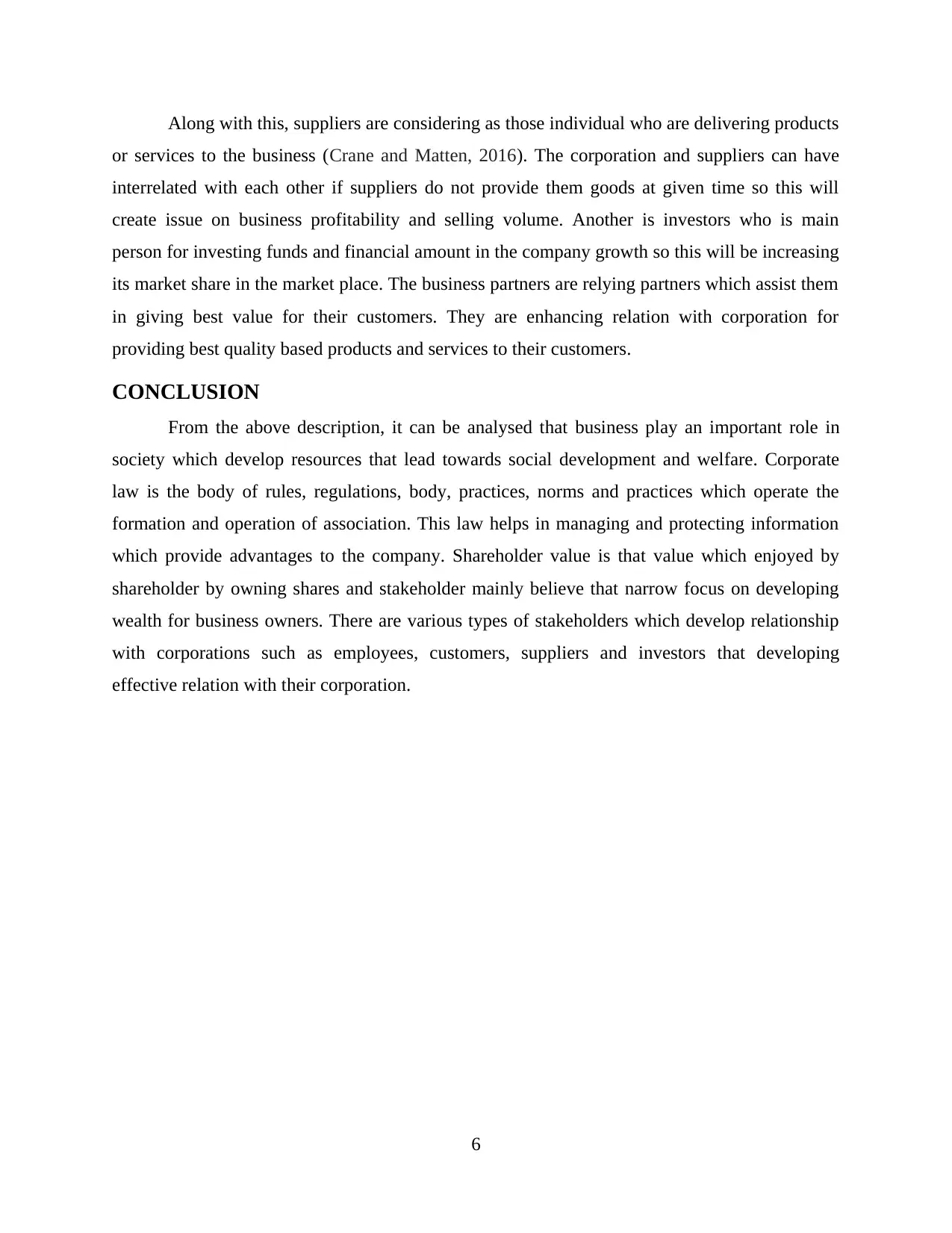
Along with this, suppliers are considering as those individual who are delivering products
or services to the business (Crane and Matten, 2016). The corporation and suppliers can have
interrelated with each other if suppliers do not provide them goods at given time so this will
create issue on business profitability and selling volume. Another is investors who is main
person for investing funds and financial amount in the company growth so this will be increasing
its market share in the market place. The business partners are relying partners which assist them
in giving best value for their customers. They are enhancing relation with corporation for
providing best quality based products and services to their customers.
CONCLUSION
From the above description, it can be analysed that business play an important role in
society which develop resources that lead towards social development and welfare. Corporate
law is the body of rules, regulations, body, practices, norms and practices which operate the
formation and operation of association. This law helps in managing and protecting information
which provide advantages to the company. Shareholder value is that value which enjoyed by
shareholder by owning shares and stakeholder mainly believe that narrow focus on developing
wealth for business owners. There are various types of stakeholders which develop relationship
with corporations such as employees, customers, suppliers and investors that developing
effective relation with their corporation.
6
or services to the business (Crane and Matten, 2016). The corporation and suppliers can have
interrelated with each other if suppliers do not provide them goods at given time so this will
create issue on business profitability and selling volume. Another is investors who is main
person for investing funds and financial amount in the company growth so this will be increasing
its market share in the market place. The business partners are relying partners which assist them
in giving best value for their customers. They are enhancing relation with corporation for
providing best quality based products and services to their customers.
CONCLUSION
From the above description, it can be analysed that business play an important role in
society which develop resources that lead towards social development and welfare. Corporate
law is the body of rules, regulations, body, practices, norms and practices which operate the
formation and operation of association. This law helps in managing and protecting information
which provide advantages to the company. Shareholder value is that value which enjoyed by
shareholder by owning shares and stakeholder mainly believe that narrow focus on developing
wealth for business owners. There are various types of stakeholders which develop relationship
with corporations such as employees, customers, suppliers and investors that developing
effective relation with their corporation.
6
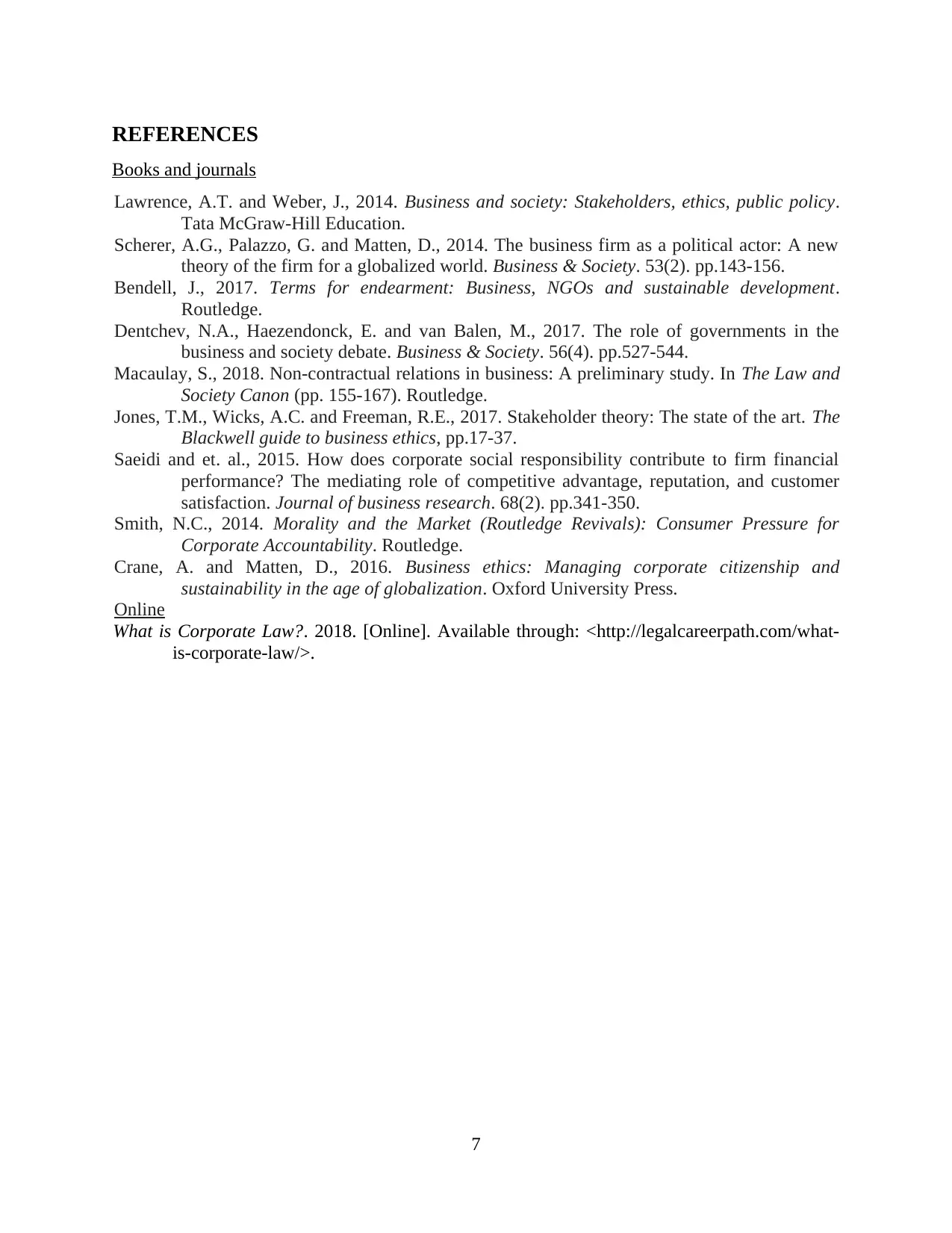
REFERENCES
Books and journals
Lawrence, A.T. and Weber, J., 2014. Business and society: Stakeholders, ethics, public policy.
Tata McGraw-Hill Education.
Scherer, A.G., Palazzo, G. and Matten, D., 2014. The business firm as a political actor: A new
theory of the firm for a globalized world. Business & Society. 53(2). pp.143-156.
Bendell, J., 2017. Terms for endearment: Business, NGOs and sustainable development.
Routledge.
Dentchev, N.A., Haezendonck, E. and van Balen, M., 2017. The role of governments in the
business and society debate. Business & Society. 56(4). pp.527-544.
Macaulay, S., 2018. Non-contractual relations in business: A preliminary study. In The Law and
Society Canon (pp. 155-167). Routledge.
Jones, T.M., Wicks, A.C. and Freeman, R.E., 2017. Stakeholder theory: The state of the art. The
Blackwell guide to business ethics, pp.17-37.
Saeidi and et. al., 2015. How does corporate social responsibility contribute to firm financial
performance? The mediating role of competitive advantage, reputation, and customer
satisfaction. Journal of business research. 68(2). pp.341-350.
Smith, N.C., 2014. Morality and the Market (Routledge Revivals): Consumer Pressure for
Corporate Accountability. Routledge.
Crane, A. and Matten, D., 2016. Business ethics: Managing corporate citizenship and
sustainability in the age of globalization. Oxford University Press.
Online
What is Corporate Law?. 2018. [Online]. Available through: <http://legalcareerpath.com/what-
is-corporate-law/>.
7
Books and journals
Lawrence, A.T. and Weber, J., 2014. Business and society: Stakeholders, ethics, public policy.
Tata McGraw-Hill Education.
Scherer, A.G., Palazzo, G. and Matten, D., 2014. The business firm as a political actor: A new
theory of the firm for a globalized world. Business & Society. 53(2). pp.143-156.
Bendell, J., 2017. Terms for endearment: Business, NGOs and sustainable development.
Routledge.
Dentchev, N.A., Haezendonck, E. and van Balen, M., 2017. The role of governments in the
business and society debate. Business & Society. 56(4). pp.527-544.
Macaulay, S., 2018. Non-contractual relations in business: A preliminary study. In The Law and
Society Canon (pp. 155-167). Routledge.
Jones, T.M., Wicks, A.C. and Freeman, R.E., 2017. Stakeholder theory: The state of the art. The
Blackwell guide to business ethics, pp.17-37.
Saeidi and et. al., 2015. How does corporate social responsibility contribute to firm financial
performance? The mediating role of competitive advantage, reputation, and customer
satisfaction. Journal of business research. 68(2). pp.341-350.
Smith, N.C., 2014. Morality and the Market (Routledge Revivals): Consumer Pressure for
Corporate Accountability. Routledge.
Crane, A. and Matten, D., 2016. Business ethics: Managing corporate citizenship and
sustainability in the age of globalization. Oxford University Press.
Online
What is Corporate Law?. 2018. [Online]. Available through: <http://legalcareerpath.com/what-
is-corporate-law/>.
7
⊘ This is a preview!⊘
Do you want full access?
Subscribe today to unlock all pages.

Trusted by 1+ million students worldwide
1 out of 9
Related Documents
Your All-in-One AI-Powered Toolkit for Academic Success.
+13062052269
info@desklib.com
Available 24*7 on WhatsApp / Email
![[object Object]](/_next/static/media/star-bottom.7253800d.svg)
Unlock your academic potential
Copyright © 2020–2026 A2Z Services. All Rights Reserved. Developed and managed by ZUCOL.



